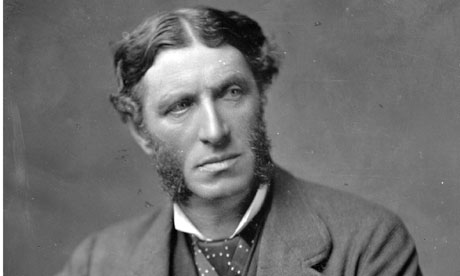Matthew Arnold: sentimental, dour, whiskered. Influenced T.S. Eliot.
ARNOLD:
Wordsworth says in one of his letters:—
“The writers in these publications, (the Reviews) while they prosecute their inglorious employment, can not be supposed to be in a state of mind very favorable for being affected by the finer influences of a thing so pure as genuine poetry.”
But is it true that criticism is really, in itself, a baneful and injurious employment; is it true that all time given to writing critiques on the works of others would be much better employed if it were given to original composition, of whatever kind this may be? Is it true that Johnson had better have gone on producing more Irenes instead of writing his Lives of the Poets; nay is it certain that Wordsworth himself was better employed in making his Ecclesiastical Sonnets than when he made his celebrated Preface, so full of criticism, and criticism of the works of others? Wordsworth was himself a great critic, and it is to be sincerely regretted that he has not left us more criticism; Goethe was one of the greatest critics, and we may sincerely congratulate ourselves that he has left us so much criticism.
The critical power is of lower rank than the creative. True; but in assenting to this proposition, one or two thing are to be kept in mind. It is undeniable that the exercise of a creative power, that a free creative activity, is the highest function of man; it is proved to be so by man’s finding in it his true happiness. But it is undeniable, also, that men may have the sense of exercising this free creative activity in other ways than in producing great works of literature or art; if it were not so, all but a very few men would be shut out from the true happiness of all men. They may have it in well-doing, they may have it in learning, they may have it in criticising. This is one thing to be kept in mind. Another is, that the exercise of the creative power in the production of great works of literature or art, however high this exercise of it may rank, is not at all epochs and under all conditions possible; and that therefore labor may be vainly spent in attempting it, which might with more fruit be used in preparing for it, in rendering it possible.
For the creation of a master-work of literature two powers must concur, the power of the man and the power of the moment, and the man is not enough without the moment; the creative power has, for its happy exercise, appointed elements, and those elements are not in its own control.
BENJAMIN:
Lithography enabled graphic art to illustrate everyday life, and it began to keep pace with printing. But only a few decades after its invention, lithography was surpassed by photography. For the first time in the process of pictorial reproduction, photography freed the hand of the most important artistic functions which henceforth devolved only upon the eye looking into a lens. Since the eye perceives more swiftly than the hand can draw, the process of pictorial reproduction was accelerated so enormously that it could keep pace with speech. A film operator shooting a scene in the studio captures the images at the speed of an actor’s speech. Just as lithography virtually implied the illustrated newspaper, so did photography foreshadow the sound film.
Even the most perfect reproduction of a work of art is lacking in one element: its presence in time and space, its unique existence at the place where it happens to be.
The uniqueness of a work of art is inseparable from its being embedded in the fabric of tradition. This tradition itself is thoroughly alive and extremely changeable. An ancient statue of Venus, for example, stood in a different traditional context with the Greeks, who made it an object of veneration, than with the clerics of the Middle Ages, who viewed it as an ominous idol.
It seems to us that Arnold is merely speculating to no purpose, while Benjamin really has something to say.
WINNER: BENJAMIN

